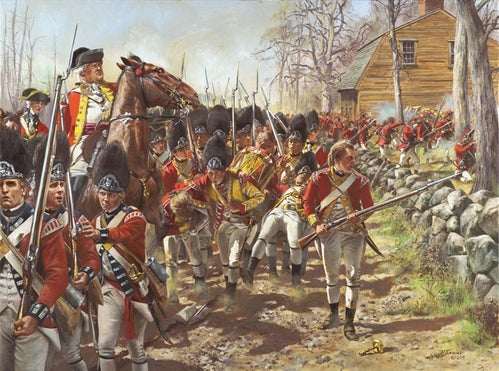W.Britains
Parker's Revenge
Parker's Revenge
Couldn't load pickup availability
This is Don Troiani print - Parker's Revenge, April 19, 1775.
Available Format of Print:
350 Signed/Numbered (available)
Overall: 30.5" x 24.5"
Image: 26.5" x 20"
$225.00
Artist Proof (available)
50 Signed/Numbered
Overall: 30.5" x 24.5"
Image: 26.5" x 20"
$250.00
Canvas Giclee (printed as ordered)
15 Signed/Numbered
Overall: 33" x 24"
$750.00
On the afternoon of April 19th, 1775, British light infantry and grenadiers began the long 18 mile march back to Boston. It had been a marginally successful expedition to Concord looking for martial supplies stockpiled in the town by the Provincial Congress for the formation of an army. The British had already been in two fights, one at Lexington Common which left Colonials dead and wounded, as well as at the North Bridge in Concord where they had lost men, and then retreated in panic. At about noon, after caring for wounded from the bridge fight, burning and destroying supplies, then pillaging items from local homes, they formed up and marched out of the town. Minute and militia companies had been congregating at Meriam's Corner, about a mile out of the town center waiting for the King’s troops on their return march. As the British crossed the small bridge over the Mill Brook, the Colonials commenced firing on the retreating column from all directions. Thus began the running battle back to Boston. The British light infantry companies were sent out as flankers and tried desperately to chase off the "Country people" who attacked the now weary soldiers while the grenadiers marched along the road.
While the regulars were trying to complete their mission in Concord, the Lexington militia under Capt. John Parker had been caring for the wounded, and mourning the dead from the previous bloodshed on Lexington Common. Once the dreadful task was complete, he reformed his men and after an impassioned speech by the Reverend Jonas Clarke, marched off towards Concord. Along the way Parker met up with the men of Capt Samuel Thatcher's company from Cambridge, which gave him a more sizable force. Soon he would exact his revenge on the long column of British he knew would be coming back along the road that fateful afternoon.
At an angle in the road near the Tabitha Nelson house close to the Lincoln/Lexington town line, Parker found the spot to commence his attack. It was a perfect position, higher up above the road on a slight hill with ledge outcroppings, boulders and tree's for cover. He could probably hear the musket firing in the distance grow closer as Lt. Col. Smith's column tried to make their escape back to the safety of Boston. The Lexington men were about to get retribution for what had been done to them on the Common earlier in the day.
Smith's British column was starting to unravel. The flankers were tiring, ammunition was getting desperately low, and casualties were mounting. The officers and NCOs under Smith's command tried valiantly to hold their men together and keep formation as they knew this was the only way to make it back to Boston. Minutemen and militia from communities all around the surrounding countryside were moving in to attack the long line of weary troops. The flankers could only do so much to hold off the men firing at them from all directions.
As the British column approached the hidden Lexington and Cambridge men, they had to cross a small bridge over a stream which slowed them and created a choke point. Just past the bridge at a bend in the road, the determined Colonials opened fire, reeking havoc on the British ranks. Men were wounded and left behind to fend for themselves; some helped along by comrades, and others fallen dead. Meanwhile, the flanking parties continued their task and ran to find cover to fire back at Parkers men hidden behind boulders, trees and a rock ledge.
Soon the column had passed, and Parkers men moved on to hard fighting at other locations along the route of the retreat. There would be much more fighting to be done before the sun went down on this April day.
Lexington had paid a high price during the events of April 19th. They had lost eight men killed and ten wounded when the British loosed musket fire and bayonets at Parker’s band of militia on the Common at daybreak. In the fighting near the Nelson house during the retreat of the regulars from Concord they had lost two more men, and another wounded. The men of Lexington will always be revered for their bravery and devotion to the cause of Liberty on that fateful day.
Joel Bohy
Share


Continue Shopping
See more of the Breagans' collection of manufacturers from all around the world
Subscribe to our emails
Subscribe to our mailing list for insider news, product launches, and more.

